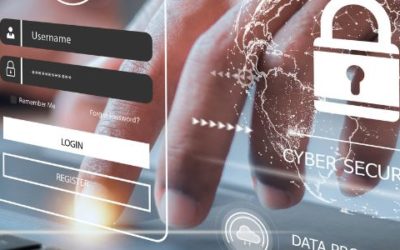Is Cyber Liability Insurance Worth It?
Cyber Insurance has become a standard practice for businesses of all sizes. Especially with cyber-attacks happening around us daily. Unfortunately, smaller companies dealing with thin margins are known to mark cybersecurity as a low priority, not realizing just how costly cyber damages can be. Below we will discuss what cyber liability insurance is and if it’s worth the cost to protect your organization’s finances.
If you already have cyber insurance or you’re wondering how you can make your premiums more affordable, check out our latest blog.
 What is cyber liability insurance?
What is cyber liability insurance?
Cyber liability insurance is a coverage plan that helps protect businesses from financial losses in the event of a computer incident, data breach, or cyberattack.
Cyber insurance policies typically cover costs such as:
- Data recovery expenses when vital business-related data or software is damaged or destroyed
- Ransoms paid to regain access to data in a ransomware attack
- Lost income if your business is temporarily shut down due to a cyberattack
- Regulatory fines handed down by state and federal agencies
- Crisis management and PR when trying to maintain or repair your reputation
- Customer notification expenses as well as the cost of credit monitoring
- And, of course, the legal fees that arise without fail when responding to an attack or a data breach
 What is cyber insurance?
What is cyber insurance?
It’s the same thing as “cyber liability insurance,” but with a different name, as per the provider.
 How much does cyber insurance cost?
How much does cyber insurance cost?
The cost of a policy will vary based on several factors, including the type and amount of data you process, the size of your business, the industry, and your cyber risk.
The specifics of what’s covered vary by provider. However, when buying a policy, you can often customize it by adding riders to cover additional concerns. Any riders you add will affect the total cost of your policy.
However, it’s important to note that the monetary costs of a data breach or cyber attack are only one piece of the bigger picture. Damage to your reputation can have untold costs down the road, but no insurance plan can cover that.
 What is the difference between cyber insurance and data breach insurance?
What is the difference between cyber insurance and data breach insurance?
Some insurance providers, such as The Hartford, offer a product called “data breach insurance,” which is intended for smaller businesses. Data breach insurance specifically covers costs related to stolen or lost data, such as credit monitoring and notification.
But data breach insurance won’t cover other types of issues, such as extortion fees due to ransomware, or lost income from network outages.
Damage to your reputation can have untold costs down the road, but no insurance plan can cover that.
 Does cyber insurance cover phishing?
Does cyber insurance cover phishing?
You’ll need to carefully review the specific policy you’re considering to see if it covers phishing. (And if it doesn’t, your provider may offer a “social engineering” rider that includes phishing coverage.)
There have been instances where businesses believed they were covered in case of a phishing incident. But when they filed a claim, they learned that their insurer’s definition of phishing was extremely narrow, and their claim was denied.
If you’ve read through the policy you have in mind and are still unclear on what it covers, you may want to consult with your insurance agent or even your attorney.
 Do I need cyber liability insurance?
Do I need cyber liability insurance?
In short, yes. Cyber liability insurance is essential to protect your business and everything you’ve worked so hard to create. Cyber damages are incredibly costly, especially when critical business data is lost or a company is forced to pay a hefty ransom to recover essential data to stay in business.
But why wait until bad things happen to protect yourself? Nowadays, ensuring that your company has a robust cybersecurity plan should be on the top of your list.
Let’s look at some recent data on the cost of cyberattacks:
- In 2020, there was a seven-fold increase in ransomware attacks. And those ransomware payments? They increased 33% in 2020—pushing the average payment over the six-figure mark.
- A report by Verizon showed that in 2019, 28% of data breaches involved small businesses.
- Over 60% of small and medium businesses reported that they had undergone a data breach in the previous 12 months.
- Despite all this, over 60% of small and medium businesses thought their companies weren’t likely to be targeted by cybercriminals.
As you can see, hackers, viruses, ransomware, and email scams are on the rise—no matter the size of your business.
At Network Computer Pros, we take a proactive, layered approach to keeping you safe. Our exclusive cybersecurity package includes things like:
- Security Operations Center (SOC): A SOC is a centralized team that monitors and responds to real-time security incidents. The SOC is responsible for detecting, investigating, and mitigating cyber threats, including malware, phishing, ransomware, and other attacks. The SOC operates 24/7 and uses advanced tools and technologies to provide continuous visibility and protection to your IT environment.
- SEIM: A SIEM is a security solution that collects and analyzes security data from various sources, including network devices, servers, applications, and endpoints. The SIEM correlates and aggregates the data to identify potential security incidents, anomalies, and trends. The SIEM also provides real-time alerts, reports, and dashboards that allow the SOC team to monitor and investigate security incidents.
- Anti Virus with ATP & EDR: We all know what basic anti-virus does for our computers. Advanced Threat Protection (ATP). ATP is a set of security technologies and practices designed to detect and prevent advanced threats, such as zero-day attacks, file-less malware, and targeted attacks. Endpoint Detection and Response (EDR) collects and analyzes endpoint activity data, such as file and registry changes, network connections, and process execution details. This information then correlates with threat intelligence data to identify and respond to advanced threats.
- Advanced Firewalls: These firewalls have advanced security features like intrusion prevention, application control, and advanced threat protection that can help protect your network from cyber-attacks and data breaches.
- Privileged Access Management (PAM) software: PAM software provides centralized management of privileged access to critical systems and data. It enables you to manage and monitor privileged accounts, access requests, and activities, reducing the risk of data breaches and insider threats.
- Backup and Disaster Recovery: Backup and disaster recovery (BDR) is essential to a higher cyber security model. BDR solutions ensure that your data is backed up regularly and can be restored quickly in the event of a data loss or disaster. BDR solutions also provide continuity for your business operations, allowing you to recover from a disaster and minimize downtime.
- Cloud Data Backup: Cloud Data Backup for cloud applications, such as Microsoft 365, ensures that your data is backed up regularly and can be restored quickly in case of a data loss, disaster, or accidental deletion.
- Spam Services: Spam services can help reduce the risk of spam, malware, and phishing emails.
- Phishing Assessments: Phishing assessments are valuable for identifying and mitigating phishing attacks. Phishing assessments simulate phishing attacks and measure the response of your employees.
- Security Awareness Training: Investing in employee cyber security awareness training can help create a culture of security within your organization and reduce the risk of cyber attacks.
- Password Managers: Password managers enable your employees to create and store complex passwords securely, reducing the risk of password-related security incidents.
- Multi-factor Authentication: Multi-factor authentication (MFA) is a security process that requires users to provide multiple forms of identification, further enhancing the security of your systems and applications.
Network Computer Pros layers of cyber security protection can keep your business safe by providing multiple layers of defense against cyber threats. With the combination of network, endpoint, and email security solutions, Network Computer Pros can help protect your business against a wide range of cyber threats like malware, phishing attacks, and data breaches. While cybersecurity insurance can provide financial protection in the event of a security incident, it is not a substitute for a solid cybersecurity strategy.
Investing in a comprehensive security package from Network Computer Pros can help prevent security incidents from occurring in the first place, reducing the risk of financial loss, reputational damage, and other negative consequences that can result from a data breach or cyber attack. Contact us today and make security a priority.
Insurance is excellent; never having to use your insurance is even better.
You might also like
The 5 Symptoms of Bad I.T. Plaguing Your Business
Welcome to the Network Computer Pros technology clinic, where we diagnose and treat the I.T....
IT Billing Model: 6 Major Benefits of Fixed-Rate Services
Managed IT Services offer significant advantages over traditional hourly billing for businesses in...
Latest LastPass Scam: Everything you should know
Understanding and Protecting Yourself from the Latest LastPass Scam After a sophisticated...



